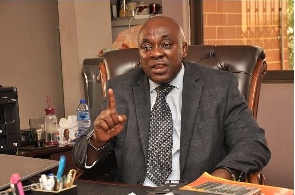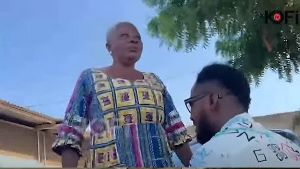 Ubaida going about her business in the streets of Accra
Ubaida going about her business in the streets of Accra
Her dream of becoming a professional nurse in the near future who could lend her support to doctors in a bid to provide adequate health care services to patients in the hospital became shattered from the very first day her parents decided to give her hand forcefully in marriage at a tender age of 12 due to poverty.
Twice she had resisted the awful attempt by parents to be married off forcefully to a man older than his father’s age in order to attain her personal freedom and pursue her future dream.
But for the third time, escape was her only way out of oppression.
Her story could be likened to that of a popular quote: “jump from frying pan to fire”, no doubt!
Ubaida,12, Kayayei (head porter) in the streets of Accra recounts the harrowing accounts of how she escape from the grips of her parents in the north only to be raped down south amidst myriad of challenges she had to battle with in her everyday work as a head porter in the Accra.
It was the most difficult decision ever to be taken by a young girl; who had to abandon her family, friends and travel several miles away from home to a strange land in search of a better life.
A decision most adults would not arrive at, out of fear and cognizance of the risk involved.
But little Ubaida did the unthinkable with the hope to survive in a bid to see her future dream become a reality.
She spoke in Mamprusi translated into English.
“I dropped out of Junior High School(JH1) at a tender age 12 since my father can no longer afford to pay my fees"
"He decided to marry me off to his friend, an old rich businessman in his 60s so he can cater for my needs.
"Such decision did not go down well with me so I escaped from my hometown Walewale, (a small town in the Northern Region) with a money I’ve borrowed from a friend. My intention was to raise money to finance my education and be free from being forced into an early marriage".
Ubaida averred that it took her hard decision, not knowing anyone in Accra or any idea about how life would treat her before coming. But maintained by the grace of God, she has been living and working as Kayayei for the past 3 years in Accra.
One of her shocking revelation was to be raped on many occasions by some miscreants who also live in the streets of Accra.
“There were times I’ve been raped at night by some of miscreants who also live on the streets of Accra” Ubaida said although she sometimes feels like going back home, she’s always feared she would get married off by her parents to that old business man if she dares step her foot over there".
Sharing her woes on the city life, Ubaida said:
“Life is very difficult for me. On a good day, I make GHC5.00 carrying people’s shopping items. I get GHC1.00 for carrying heavy loads and GHC 50 pesewas for lighter items. I sleep in front of people’s shops every night”.
When asked what would she like to do whenever she get help, Ubaida quickly said: “I would like to continue my education.
My dream is to be given a home and an education. I know I can make it if I just get the chance”.
These are harrowing experiences shared by Ubaida. Even worse more of these experiences you’re likely to hear from most Kayayei in the streets or Accra Kumasi, Techiman including other parts of the country.
Kayayei is a term used to describe women and girls who earn money by carrying loads on their heads in urban lorry parks and markets in urban areas and cities of Ghana. They predominantly migrate from the three Northern Regions of the country namely; the Northern, Upper East and Upper West Regions.
The majority of them without little or no education tend to leave their home state around the age of 13-17 and stay in their destination cities for a maximum of five years, sometimes return home(returnees) and migrate back to the cities.
Kayayei represent a highly marginalized and vulnerable group of girls and women in Ghana. The work is precarious, no job securities and worst of all they are poorly paid. They lack access to a number of key services including shelter and healthcare. Kayayei live in poor sanitary conditions in overcrowded and deprived neighborhoods and are particularly exposed to communicable diseases such as malaria, skin infections and water-borne diseases. Many also sleep in the open, especially in front of shops and are further exposed to abuses including robbery, eviction, and sexual violence.
Currently the total number of Kayayei in the country is unknown but a mapping exercise which began in 2017 by the Ministry of Gender, Children and Social with support of UNFP is believed to soon provide additional information on their volumes and trends.
But so far available statistics indicates that over 60,000 of Kayayei (vulnerable young women and girls) lives under worst conditions in the streets of Accra, Kumasi and Techiman in Ghana. Like Ubaida, all these girls need care, attention and serious help to go back to school.
Ubaida’s plight has really touched the hearts of the Purim African Youth Development Platform(PAYDP), an NGO that supports Kayayei to understand their legal rights through legal literacy training, livelihood empowerment training and gives sexual and gender based violence information and services to these vulnerable girls.
The NGO has therefore decided to embark on a project to raise money to support her including other 200 street girls to go back to school in a bid to guarantee them a brighter future.
Under the project dubbed “Support 200 street girls to go back to school”, PAYDP is committed to raising an amount of $3,000 through public support via Gofundme web portal(www.gofudme.com) to achieve its dream.
Let’s all join in the fight to end gender-based violence and forced marriage which is being perpetrated against our school-going age young girls. Girls like Ubaida need our support to go back to school therefore let us all put our hand to the wheel and render our support by contributing generously to support the above project for a better future of these young disadvantage ones.
Winning this fight is easy and equals to Ghana achieving the United Nations Sustainable Development Goals which deserve a concerted effort, not only from government but from all of us.
- Ending child marriage: Victim attempted suicide
- Teacher defiles minor, bribes her with ¢20 cedis
- Man defiles, impregnates 15-year-old girl in a mosque
- Ajumako Essasan chiefs, elders forcing 14-year-old defilement victim to abort pregnancy
- Shatana appointed ambassador to help fight nudity, prostitution and child abuse in Ghana
- Read all related articles












